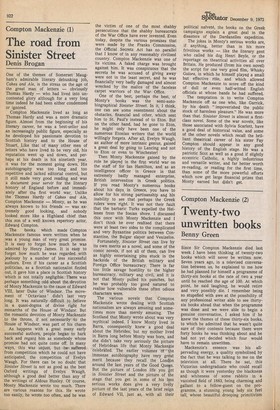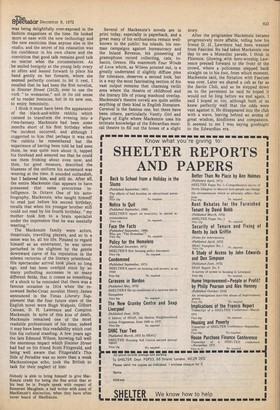Compton Mackenzie (2)
Twenty-two unwritten books
Benny Green
Since Sir Compton Mackenzie died last week I have been thinking of twenty-two books which will never be written now. Seven years ago, in a televised conversation between us, he explained to me how he had planned for himself a programme of thirty-six books at the rate of two a year until be reached the age of 100. At which point, he said laughing, he would retire and very possibly die. I remember being so stupefied with awe at the possibility of any professional writer able to see thirtysix books ahead that when the programme was done and we were able to begin a genuine conversation, I asked him if he knew the themes of these thirty-six books, to which he admitted that he wasn't quite sure of their contents because there were forty books he was thinking about and he had not yet decided which four would have to remain unwritten.
Mackenzie's essence was his allpervading energy, a quality symbolised by the fact that he was talking to me on the television at all. There he sat, this Victorian undergraduate who could recall as though it were yesterday the blackness and whiteness of some rabbits in a vanished field of 1883, being charming and gallant to a fellow-guest on the programme, a stunning young lady six feet tall, whose beautiful drooping primitivism
was being delightfully over-exposed in the fashion magazines at the time. He looked more at ease with the new technology and the new exoticism than anyone else in the studio, and the secret of his relaxation was his confidence in his own charm and the conviction that good talk remains good talk no matter what the circumstances. As he smiled benignly at the young lady every so often and leaned forward to place his hand gently on her forearm, where she seemed perfectly content to let it rest, I recalled that he had been the first novelist, in Sinister Street (1913), ever to use the verb "to womanise," not in its old sense of to render feminine, but in its new one, to enjoy femininity.
I think it must have been the appearance of the black-and-white rabbits which seemed to transform the evening into a . time-fantasy. Mackenzie had been some moni.hs short of his first birthday when the incident occurred, and although I suggested to him that perhaps it was not the rabbits he remembered but the experience of having been told he had seen them, he was quite sure about it, tapped his forehead and assured me that he could see them frisking about even now, and then, for good measure, described the blueness of the uniform his nursemaid was wearing at the time. It sounded outlandish, but I believed him, and still do. After all, the entire Mackenzie clan appears to have possessed that same precocious intelligence. In Octave One of his autobiography, Mackenzie, who taught himself to read just before his second birthday, recalls that when his younger brother still could not read by his fourth birthday, 'my mother took him to a brain specialist under the impression that he was mentally wanting."
The Mackenzie family were actors, theatricals, travelling players, and so in a sense was he, all his life. Pleased to regard himself as an entertainer, he was never perturbed in the slightest by the gentle downward curve of his reputation in the solemn rectories of the literary priesthood. His spectacular arrival took place so long ago, and has been overlaid since by so many potboiling successes in so many different fields, that it comes as something of a shock to be reminded that there was a famous occasion in 1914 when the renowned Serbo-Croat novelist Henry.James announced in the Times Literary Supplement that the four future stars of the English novel were Hugh Walpole, Gilbert Cannan, D. H. Lawrence and Compton Mackenzie. In spite of this kiss of death, Mackenzie remained one of the most readable professionals of his time; indeed it may have been this readability which cost him his cultural standing. A few years ago the late Edmund Wilson, knowing full well the enormous impact which Sinister Street had had on his friend Scott Fitzgerald, and being well aware that Fitzgerald's This Side of Paradise was no more than a weak Mackenziesque echo, took the British to task for their neglect of him:
Nobody is able to bring himself to give MacKenzie credit for being the fine artist that at his best he is. People speak with respect of Somerset Maugham, a bad writer with none of MacKenzie's distinction, when they have often never heard of MacKenzie. Several of Mackenzie's novels are in print today, especially in paperback, and a great many of his enthusiasms remain wellknown to the public: his islands, his oneman campaigns against bureaucracy and the Inland Revenue, his pioneering of gramophone record collecting, cats, tobacco, Greece. His mammoth Four Winds of Love which, as Wilson pointed out, is a greatly underrated if slightly diffuse plea for tolerance, deserves a second look, but in a way the most fascinating section of his vast output remains that charming twilit area where the theatre of childhood and the literary life of young manhood overlap. Mackenzie's theatre novels are quite unlike anything of their kind in English literature. Carnival is the famous one, but there have been others, particularly Vanity Girl and Figure of Eight where Mackenzie uses his intimate knowledge of the Edwardian musical theatre to fill out the bones of a slight story.
After the programme Mackenzie became progressively more affable, telling how his friend D. 1-1. Lawrence had been weaned from Fascism. He had taken Mackenzie one day to see a Mussolini parade, I think in Florence. Glowing with hero-worship Lawrence pressed forward to the front of the crowd, where a policeman stepped back straight on to his foot, from which moment, Mackenzie said, the flirtation with Fascism was over. Later we shared a cab as far as the Savile Club, and as he stepped down on to the pavement he said he hoped it would not be long before we met again. I said I hoped so too, although both of us knew perfectly well that the odds were vast against it. He disappeared into the club with a wave, leaving behind an aroma of great wisdom, kindliness and compassion. It seemed to me I was saying goodnight to the Edwardian era.











































 Previous page
Previous page